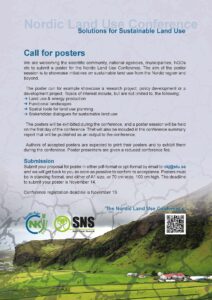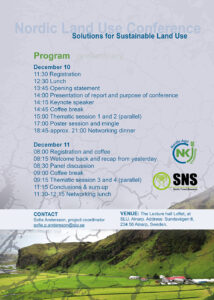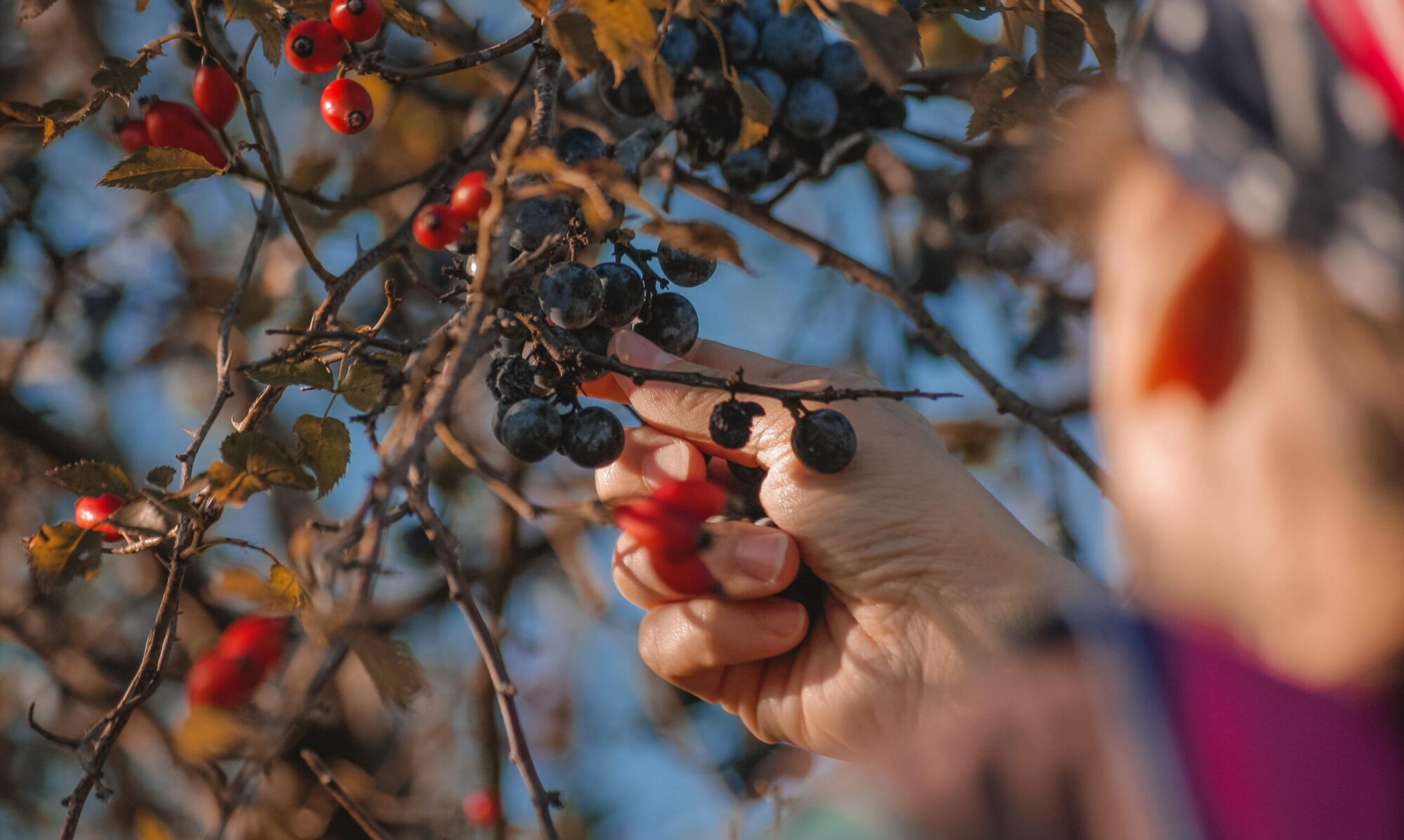How can we balance the multiple needs of land use in the Nordic region? Nordic Agri Research (NKJ) and Nordic Forest Research (SNS) invite you to a conference where solutions for sustainable land use will be discussed from both research and policy perspectives.
The Nordic Land Use Conference
– solutions for sustainable land use in the Nordic region
Venue: The conference venue is the Lecture hall Loftet, at the Swedish University of Agricultural Sciences, in Alnarp. Address: Sundsvägen 6, 234 56 Alnarp, Sweden.
Time: 10-11 December, 2025
Fee: Conference participation is free of charge!
The conference aims to engage researchers, state officials, municipal workers, interest groups, intergovernmental organisations and private land owners from the Nordic region in a dialogue on policy needs related to land use.
The program will begin with a presentation of the report “Changes to Agricultural Land Use in the Nordic Countries – and Future Prospects for Collaboration”, providing an overview of changes in land use and future opportunities for collaboration. This will be followed by keynote speakers who will delve into the conference’s overarching theme.
The conference will then continue with thematic sessions that delve deeper into current issues. These sessions will bring together research projects and policy examples from the Nordic countries, with discussions led by experienced moderators to foster a dynamic and constructive dialogue.
Don’t miss the opportunity to participate in this important conference and contribute to the development of more sustainable land use in the Nordic region!
 Call for posters
Call for posters
We are welcoming the scientific community, national agencies, municipalities, NGOs etc to submit a poster for the Nordic Land Use Conference. The aim of the poster session is to showcase initiatives on sustainable land use from the Nordic region and beyond.
The poster can for example showcase a research project, policy development or a development project. Topics of interest include, but are not limited to, the following:
- Land use and energy production
- Goal conflict management in land use planning
- Functional landscapes
- Spatial tools for land use planning
- Stakeholder dialogues for sustainable land use
The posters will be exhibited during the conference, and a poster session will be held on the first day of the conference. The poster will also be included in the conference summary report that will be published as an output to the conference.
Authors of accepted posters are expected to print their posters and to exhibit them during the conference. Poster presenters are given a reduced conference fee.
Submission of poster
Submit your proposal for poster in either pdf-format or ppt-format by email to and we will get back to you as soon as possible to confirm its acceptance. Posters must be in standing format, and either of A1 size or 70 cm wide, 100 cm high.
The deadline is passed.
Register here
The conference is free of charge!
Deadline for registration is past.
 Preliminary program
Preliminary program
Day 1
11:15–12:15 Registration
12:15–13:15 Lunch
13:30–13:40 Welcome and purpose of the conference w. Aðalsteinn Sigurgeirsson, president of SNS
13:40–13.50 Results from report on agricultural land use change in Nordic region w. Sofie Andersson and Malin von Essen
13:50–14:20 Keynote w. Henrik Vejre
14:20–14.30 Information on thematic sessions
14:30–15:00 Coffee break
15:00–17:00 Thematic session 1 & 2 (parallel)
17.00–17.15 Conclusions & sum up day 1
17:15–19:00 Poster session and mingle
19:00–approx. 21:00 Networking dinner
Day 2
08:00–08:15 Registration and coffee
08:15–08:30 Welcome back and recap from yesterday
08:30–09:00 Keynote w. Arne Bardalen
09:00–09:20 Coffee break
09:20–11:20 Thematic session 3 & 4 (parallel)
11:20–11:45 Conclusions & sum up
11:45–12:45 Networking lunch
Thematic sessions
Each thematic session will engage the participants in a discussion on solutions and challenges to get there within the chosen topic. The session will begin with 2-3 presentations of best practices, tools and models which will be followed by a workshop.
Thematic session 1
Balancing Solar Energy and Land Use: Policy and Practice in the Nordic Region
Description: This session explores policy development and emerging research related to the expansion of photovoltaics (PV) in the Nordic region. With increasing demand for renewable energy, particularly solar power, land use planning faces new challenges in balancing energy production with other policy goals such as forestry, biodiversity, agriculture, and cultural heritage. The session will highlight guidelines and practical examples of how photovoltaics can be integrated into Nordic landscapes in a sustainable and accepted way.
Confirmed speakers:
• Sanna Andersson, Senior Ministerial Adviser, Ministry of the Environment, Finland
”Policy development for regulating solar power expansion in Finland”
• Espen Olsen, Professor at the Dep of Physics, Norwegian University of Life Sciences
”Agri-PV: Combining agriculture and solar energy in Nordic countries”
Thematic session 2
Collaborative approaches to functional landscapes I
Description: This session focuses on functional landscapes and the opportunities they offer to combine production, biodiversity, and other land use objectives. It will explore how collaborative approaches – such as stakeholder dialogues – can help balance competing interests, align national and international policy goals, and enhance synergies in land use.
Through examples from the Nordic region, the session will highlight how improved cooperation between stakeholders can support more sustainable and multifunctional landscapes. Case studies will demonstrate how dialogue can serve as a powerful tool to increase acceptance of land use changes, reconcile private and public interests, and foster innovative solutions. The session also considers how successful models and tools can be scaled or adapted to other Nordic contexts.
Confirmed speakers:
• Hreinn Oskarsson, Head of department at Land and Forest Iceland
”Stakeholder inclusion and involvement in the Hekluskógar project”
• Carina Wettemark, Head of the Unit for Biosphere and Naturum and Coordinator for UNESCO Biosphere Reserve Kristianstads Vattenrike
”Stakeholder involvement for functional landscapes – Biosphere Reserve
Kristianstads Vattenrike”
Thematic session 3
Spatial tools to support decision- and policymaking
Description: Spatial data, analysis, and modelling offer valuable support for decision-making in complex and multi-layered land use contexts. This session explores how spatial tools can serve as a knowledge base to guide planning and policy development. Key themes include the integration of diverse data sources, practical applications for land use planning, and strategies for user accessibility.
Confirmed speakers:
• Benjamin David Henning, Professor of Geography at the University of Iceland
”Participatory mapping platform for ecological restoration of the Icelandic highlands”
• Moritz Kaiser, M.Sc. at Michael Succow Foundation, Partner in the Greifswald Mire Centre
”The European wetland map”
• Gunnhild Søgaard, Head of Department Forest and Climate, Norwegian Institute of Bioeconomy Research (NIBIO)
”Map-based greenhouse gas calculator for spatial planning purposes”
Thematic session 4
Collaborative approaches to functional landscapes II
Description: This session focuses on functional landscapes and the opportunities they offer to combine production, biodiversity, and other land use objectives. It will explore how collaborative approaches – such as stakeholder dialogues – can help balance competing interests, align national and international policy goals, and enhance synergies in land use.
Through examples from the Nordic region, the session will highlight how improved cooperation between stakeholders can support more sustainable and multifunctional landscapes. Case studies will demonstrate how dialogue can serve as a powerful tool to increase acceptance of land use changes, reconcile private and public interests, and foster innovative solutions. The session also considers how successful models and tools can be scaled or adapted to other Nordic contexts.
Confirmed speakers:
• Sara Vangerschov Iversen, Ph.D Landscape Ecologist and Tenure Track Assistant Professor at Center for Sustainable Landscapes under Global Change, Aarhus University
”Understanding human values in the implementation of multifunctional landscapes in Denmark”
• Emma Luoma, Leading specialist at Akordi
”Platform for reindeer husbandry and wind power in Finland”
How to get there
When travelling abroad by plane, it is recommended to fly to Copenhagen airport Kastrup. From the airport to the venue you can take the train directly from the airport to Burlöv station and from there take the bus to Campus Alnarp. You can buy your train/bus ticket in the Skånetrafiken machines at the airport or in the Skånetrafiken app.
Organisers
Nordisk Kommitté för Jordbruks- och matforskning (NKJ) and SamNordisk Skogsforskning (SNS), funded by the Nordic Council of Ministers
Background
During the Nordic Committee of Senior Officials for Fisheries, Aquaculture, Agriculture, Food and Forestry (EK-FJLS Agriculture and Forestry) meeting in Hardanger in April 2022, land use conflicts related to food production and agricultural land were discussed. The committee members recognised that agricultural and arable land is a limited resource, and that strategies and political guidelines to limit agricultural land loss and ensure food security while also ensuring that other national needs are met differ among Nordic countries. Following this discussion, Nordic Agri Research (NKJ) and Nordic Forest Research (SNS) were assigned to provide the committee with further knowledge on the situation of agricultural land and how agricultural land use disputes are handled in the Nordic countries. The results from this report form the foundation for this conference.


